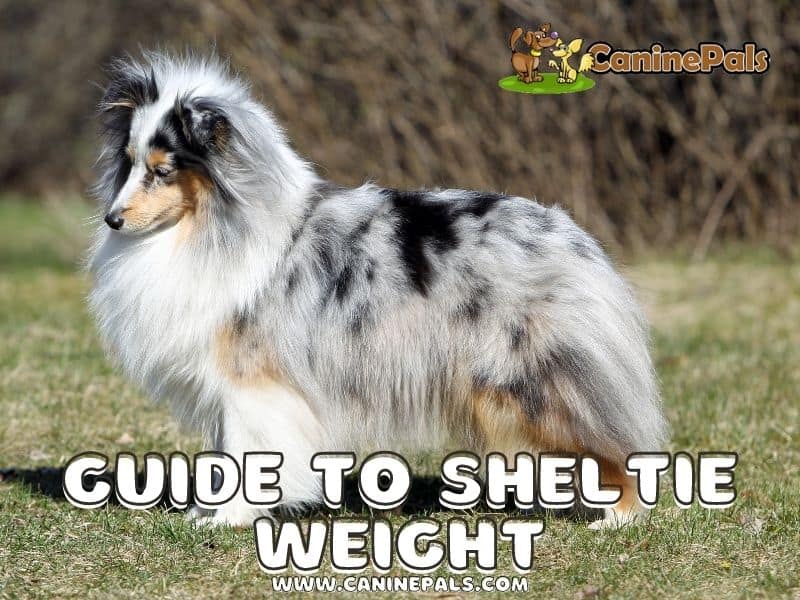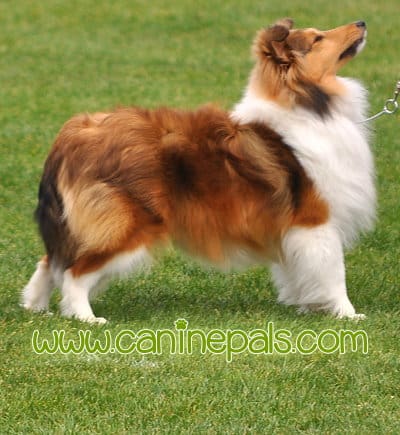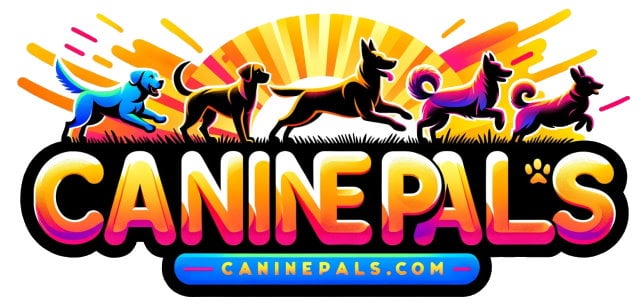Last Updated on September 25, 2021 by Denise Leo. Post first published on September 24, 2021.
The Shetland Sheepdog is also known as a Sheltie. It comes from the rugged Shetland Islands in Scotland and is commonly bred as a hard-working sheepdog with a strong herding instinct. For this reason, it is a very active dog that needs a lot of exercise. Other traits include intelligence and the ability to be highly trained.
It’s important to keep the weight of your Sheltie in check as many of these dogs can be overweight and as a breed, shelties generally love food.
The average ideal Sheltie weight is around 20 pounds. The Shetland Sheepdog stands between 13 and 16 inches tall at the shoulders. If your Sheltie is overweight, get your vet to check for any causes such as thyroid, food, or other issues.
How Much Should a Sheltie Dog Weigh?
Shelties are one of the most popular dog breeds in America. They are intelligent, energetic, loving, and loyal. Because of these qualities, they can be a great pet for any family. However, it is important to know the ideal weight for a Sheltie if you’re looking to adopt or purchase one.
The ideal Shetland Sheepdog average weight is between 15-30 pounds. The best way to determine this is by using an online dog weight calculator. These calculators are usually accurate even when used on mixed breeds because they take into account both height and weight when calculating an animal’s healthy weight range.
In order to be sure that the weight of your Sheltie is ideal, you need to consider the size. As this can vary a lot within different dogs within the breed, you need to check how tall your Shetland is. If your adult Sheltie puppy is short it should weigh less than another that is taller.
So, first, measure the height of your dog in inches. Once you have measured this, take a look at the chart on this page, which plots average weight according to the height of a typical Sheltie. If your dog has an ideal weight it should fall on the blue line. This weight chart is a good rough guide.
According to the weight chart mentioned, the ideal weight of a Sheltie ranges from 20 pounds for a 13-inch tall dog to approximately 30 pounds for a 16 inch tall adult Sheltie puppy, Some dogs may be outside these weight limits but could still be OK if they have a heavier bone structure.

What Are The Healthiest Foods for a Sheltie Diet?
Shetland Sheepdogs are a working dog breed and they need to eat food that will help them maintain their energy levels and stamina. This food needs to provide all the basic nutrients your dog needs to be healthy.
A diet for a Shetland Sheepdog needs to include foods that contain enough fats and carbohydrates. Proteins should be lean and sources of calcium, such as fish, should be given often. Dogs need more than just meat in their diet.
A Shetland Sheepdog’s basic food requirements are as follows: 25-30% protein, 65-70% carbohydrates, less than 2% fat, with 10-12% calcium and phosphorus with the exception of those who have special medical conditions or those who are pregnant or nursing puppies.
If your Sheltie does gain weight, then a quick check, (see below for how to do this), can reveal if your dog needs to eat less food.
It is equally important to feed your dog enough so that your dog is healthy and full of energy.
Be sure to divide up the food you give your dog into two or three meals per day, as this promotes a healthier eating habit and prevents weight gain.
Dry food, if based on high protein sources such as beef or fish works well and is a healthy source of nutrition for your dog.
Healthy ways to lower calorie intake but still maintain healthy nourishment include feeding the dog cooked vegetables. These dogs love them and they introduce fiber into the diet which leads to better gut health and digestion. Another good food for weight loss is canned pumpkin. This has been tried and tested by many Sheltie owners.
How to Get Your Shetland Sheepdog Into Shape With The Right Training & Dog Food?
One of the most popular dog breeds, the Shetland Sheepdog is a smart and friendly companion. But they can be high energy and need the training to live in a house. What better way for this dog to be its best self than with proper nutrition and training?
All dogs need proper nutrition and exercise in order to lead happy lives. They will need more of both as they age, but even puppies can benefit from good food and regular walks. To keep your Sheltie at its best, it’s important to consider its dietary needs as well as its activity level when feeding it.

Shetland Sheepdog Diet Tips
Here are a few useful tips from owners on SheltieForums.com to help your Sheltie lose and maintain a healthy level of weight:
- Adding green beans to their dog food. The green beans will quickly satisfy your dog’s appetite, whilst avoiding any extra calories.
- Be tough because these dogs can melt your heart with a desperate and cute look as if to say, I am starving, please feed me. You have to try to resist for your dog’s sake. Otherwise, you could be killing it with kindness!
- Give treats and snacks sparingly and make sure they are healthy ones. One owner on SheltieForums.com claims that treats are one of the major causes of Shelties being overweight and once you give a treat they will soon ask for more!
- Long walks rather than running or a sudden burst of exercise because can cause damage to your dog’s joints if he or she is overweight.
- There are some lower-calorie dog foods that can be tried such as Diet Metabolic Weight Management Dry Dog Food, often recommended by vets. It can be prescribed for your overweight Sheltie so do speak with your vet.
- Rather than guessing how much food to give or by just using a scoop and giving roughly the right quantity, measure by weighing the food first. This way you will give the correct amount every time.
How Do You Know If Your Sheltie is Overweight?
Some signs that your dog may be overweight are trouble breathing, difficulty standing up, or difficulty walking or running long distances.
When you take your Sheltie for a walk, does he sometimes stop and pant as if he is tired? If you see any of this in your dog, this is a clear sign that there is a problem. One reason why this might be happening is that your dog is overweight. Obviously, if it is very hot you can put this down to the weather, but otherwise, your Sheltie should be active and energetic, not showing signs of tiredness.
How do you know if your Sheltie is overweight? There are a number of things that you can look for to determine the weight of your dog. The most obvious sign that your dog may be overweight is looking at how thick their waist is. It should be proportionate to their height and it should not be more than halfway up their rib cage.
If you notice an unusual amount of hair on your Sheltie’s back, this could also indicate that they are carrying weight there from being overweight. Also, if they have a thick coating of hair on their tail and legs, this can indicate a problem with weight as well.
Another way you can check if your Sheltie is overweight is by examining the dog’s ribcage. You should be able to feel the ribs a little and there should be a clearly defined chest. The Sheltie should have an athletic shape so if you find your dog has no defined shape, then it is probably overweight. You should also examine the dog’s waistline because there shouldn’t be much fat around it if they are at a healthy weight level.
According to an owner on Reddit, the best way to check if your Sheltie is overweight is to look at the dog from above and notice if your dog has a clear waistline. One recommendation for doing this more easily is to do this when your dog’s fur is wet.

What is the Shetland Sheepdog Average Weight?
The average weight for a Shetland Sheepdog is around 20 pounds.
What Are The Major Causes of Excessive Weight in Shelties?
Excessive weight should not be ignored as it can lead to other health problems such as diabetes, arthritis, and bone dislocation, among others. Therefore it should be taken seriously and the owners should consult their vet for advice on how to lose or maintain their dog’s weight in a healthy way.
Certain genetic conditions can cause them to store fat and gain weight. The other two causes are overfeeding and lack of exercise.
The typical Shetland Sheepdog is a small dog that has a high metabolism and needs to eat often. It is natural for them to be overweight if they are not eating the right food or eating too much food.
Some other common reasons for excessive weight in Shelties are allergies, thyroid issues, and genetics. If your dog is allergic to certain foods then it may be overweight because it cannot digest the food properly. If your dog has an underactive or overactive thyroid gland then there may be an issue with its metabolism which could make it obese or thin respectively.
Thyroid issues can slow down your dog’s metabolism which can contribute to or cause a gain in weight. Thyroid problems often develop with age and so this is something you need to be aware of and check your dog for. If in any doubt, your vet can get a thyroid test done on your Sheltie.
One of the most common causes of weight gain in Shelties is the laziness of owners! It requires some effort to give your dog the exercise it needs each and every day no matter what the weather outside. In the long run, this will lead to a healthier and fitter dog that will not have weight issues.

Problems that Excessive Weight Can Cause in Shetland Sheepdogs
Obesity is a common problem in Shelties because they are so energetic herding dogs and like to eat. It requires a careful owner to limit the amount of food that your dog consumes each day.
One reason why weight problems including obesity should be taken seriously is that excessive weight can place strain on joints, causing problems for the animal. Obesity can also make digestion worse and possibly may cause back pain issues and even heart problems (Patt Veterinary Hospital). It is necessary to go get advice from your vet if you suspect your dog has any of these problems or might be obese. Don’t wait, it’s not fair on your dog.
Other problems for an overweight Sheltie include the increased risk of developing diabetes or Bladder Cancer. These two health risks are serious and are major reasons to regularly check the weight of your dog.
Temporary obesity has its risks too, so early action to correct any excessive weight gain in your Sheltie is very important. If your dog suffers from obesity for even a short time, this can negatively affect the kidneys and cause physical problems such as skin issues and ligament problems. Longer-term obesity can cause Arthritis, which will give your dog a much more unpleasant life.
So, at the earliest sign of any weight problems, be sure to take your Sheltie for a check-up and discuss your concerns with your vet.
Conclusion
The average Sheltie weight varies based on the individual dog. The average weight of a shetland sheepdog is around 20 pounds. Consult your veterinarian for advice if you’re concerned that your dog may have gained too much or lost too little weight. To learn more about caring for your dog, we invite you to explore our blog posts related to other common topics such as grooming and training.
Copyright CaninePals.com. All Rights Reserved.
References and Further Reading:
[1] American Kennel Club, Shetland Sheepdog Information.




